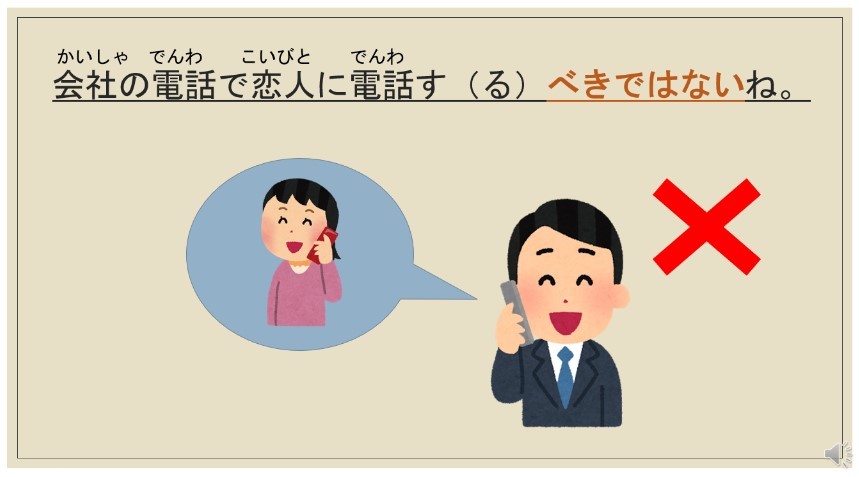べき (beki) is a verbal suffix indicating something that should be done, generally referring to a moral obligation or duty.
べき has a stronger meaning than other forms such as 方がいい and はず. For this reason, ベき is not used to make suggestions, as we will see later.
There are also different forms of べき which take on different meanings and have a different level of formality between them.
In this post we go to see all the forms and variations of べき to learn their meaning through examples of real sentences.
How do you use べき
べき is conjugated as a noun. The verb preceding べき remains in its base form, and it is simply followed by べき without variations:
There is a special case with the verb する. This can be formed either as するべき or as すべき:
- するべき is a more colloquial form
- すべき is a more formal form

バイトより勉強すべき理由。
Reasons why you should study rather than work part-time.
べき comes from the kanji 可き, which is rarely used
You should do (obligation) べきだ
In its basic form with the addition of the copula だ, べきだ indicates an action you should / must do.
べき can be translated as you should (conditional) or must (obligation) depending on the sentence.
The original meaning of べき indicates an obligation, something that you are expected to do, and therefore you should (or rather you must 💁🏼♂️) do.
Let's see some examples of using the form べきだ:
彼女にあやまるべきだ。
You should apologize to her.
The use of べき in this example makes us understand that what has been said is not a simple suggestion, but an explicit request to apologize. This is because べき conveys the idea that there is an obligation or duty to perform the action, which in this case is to apologize.
もっと勉強すべきだ。
You should study more.
Also in this second example we can understand how what has been said is not a suggestion. In fact, one might think that the one who is told this sentence has an obligation towards someone, and that not studying is causing problems towards this obligation.
From a motivational video:

人生でやめるべきたったの1つの事。
Only one thing to stop doing in life.
やめるだけ奇蹟連発する!
Just stop doing it and you'll get a series of miracles!

人生の進むべき道をあきらかにする3つの手順。
Three steps to clarify the path you should take in your life.
べき followed by a noun
When べき is followed by a noun it indicates something we should do:
やるべきことがいっぱいある。
There are many things I should do.
Don't use べき for hints
As seen in the previous paragraph, べき is not used to make suggestions.
This is because the meaning of べき is very strong, and instead of being interpreted as you should (as a hint) it is instead interpreted as you have an obligation to.
For this reason, when using べき to tell someone what to do, this is seen more as a rebuke.
べき is therefore used for:
- Indicate what I myself should do
- Indicate a general rule that everyone should follow (
you have to pay taxes,you have to raise your children well, etc.) - Ask someone their opinion about something you should or shouldn't do
ねえ、彼に電話をするべきだと思う?
Hey, do you think I should call him?
Using べき in its negative form "you shouldn't"
If we change the copula following べき to its negative form ではない / じゃない, then the meaning becomes you shouldn't.
Also in this form the preceding verb is conjugated in the its basic form.
ではない and じゃない have the same meaning; ではない is the more formal form, while じゃない is the colloquial form:
そんなことを言うべきではない。
You shouldn't say such a thing.
そんなことを言うべきじゃない。
You shouldn't say such a thing.

会社の電話で恋人に電話するべきではないね。
You should not phone your girlfriend from your company phone.
The use of べき in the past tense
It is also possible to conjugate the copula in the past tense form だった.
In this case べき expresses a regret, something you should have done in the past, but you have not done:
彼女の電話番号を聞くべきだった。
I should have asked her for her number.
The particle か with べき
Another form is to follow べき from the particle か: べきか (bekika).
This form is for wondering if I should or shouldn't take a certain action:
生きるべきか死ぬべきか。
To be or not to be.
It is also possible to use かどうか in place of か to emphasize this meaning.
かどうか means "I should or shouldn't"
iPhone6を買うべきかどうか迷っている。
I wonder whether or not I should buy an IPhone 6.
Indicate a purpose with ベく
Grammatically, べく is the conjunctive form (連用形) of べき. Nevertheless, べく has a different meaning than べき.
べく in fact is used to indicate an action performed to achieve a predetermined purpose. Therefore, べく can be translated as for the purpose of.
べく is a formal way of indicating a purpose. There are more colloquial expressions with the same meaning
彼は、弁護士になるべく法学部に入った。
He entered law school to become a lawyer.
There's no chance with べくもない
Adding the particle も and ない (not to exist) to べく forms the expression べくもない, which means there is no chance (of something happening).
This expression means something that is not possible in any way, even if you try hard:
絵は写真にはおよぶべくもない。
A drawing cannot be compared with a photograph.
Negative form of べし: べからず
べからず is the negative form of -べし and is used as an imperative form in the negative:
芝に入るべからず。
Stay off the lawn.
べからず is a mostly literal and written form
Similar grammar points in Japanese 📚
申し訳ございません
申し訳ございません (moshi wake gozaimasen) Meaning Japanese Grammar - I Apologize
わけがある
わけがある (wake ga aru) Meaning Japanese Grammar - There Is a Reason If
わけがない
わけがない (wake ga nai) Meaning Japanese Grammar - There Is No Reason That
わけではない
わけではない (wake dewa nai) Meaning Japanese Grammar - Does Not Mean That
わけだ
わけだ (wake da) Meaning Japanese Grammar - That's Why...
わけが分からない
わけが分からない (wake ga wakaranai) Meaning Japanese Grammar - Absurd